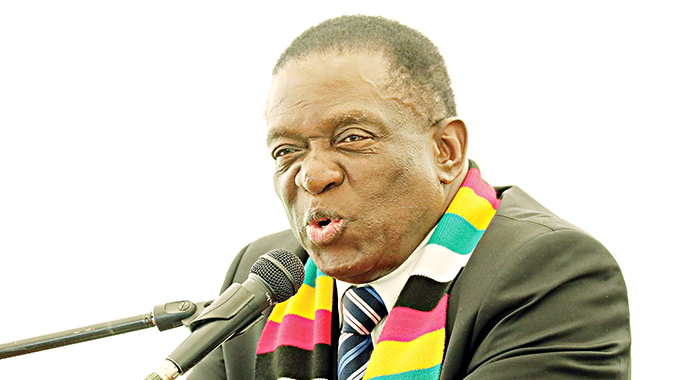EDITORIAL COMMENT:President-Matabeleland Collective meeting sets tone for national healing

PRESIDENT Mnangagwa’s inaugural meeting with the Matabeleland Collective – a grouping of civil society organisations from the region — has set the tone for the ventilation and resolution of some pertinent issues affecting the people of Matabeleland.
In a clear departure from the past when contentious matters such as the post-independence disturbances in the Midlands and Matabeleland regions were taboo, President Mnangagwa is determined to put closure to such issues and his candid, frank and robust engagement with civil society leaders at State House in Bulawayo on Friday laid the groundwork for future meetings.
True to the mantra of the new dispensation where openness is a virtue, members of the Matabeleland Collective were able to present their grievances to the President who took time to listen and respond to some of their concerns. The meeting signals the beginning of a process leading to national cohesion, peace and reconciliation.
What was striking about the indaba was the attendance of virtually all civil groups previously opposed to the Government with their erstwhile hostility now set to be channelled towards a more progressive path. Zimbabwe cannot achieve its goals, let alone economic growth, without unity of purpose among all the country’s citizens.
By engaging the Matabeleland Collective, President Mnangagwa is not only embracing Zimbabweans in their diversity but has shown a clear willingness to address some of the unresolved issues such as Gukurahundi which the previous Government under former president Robert Mugabe largely skirted.
One of the key tenets of the National Peace and Reconciliation Commission which was established by President Mnangagwa at the beginning of his tenure is to support and entrench a culture of human rights and democracy, secure the observance of democratic values and principles by the State and all institutions and agencies of government as well as ensuring that injustices are remedied as provided for in Section 233 of the Constitution.
The Commission has already held meetings in various parts of Matabeleland and the Midlands in pursuit of its mandate and was instrumental in arranging the President’s interface with the Matabeleland Collective. At the meeting, President Mnangagwa did not bring a prepared speech, affording the attendants ample time to air their grievances. The meeting discussed compensatory development, national healing, devolution and inclusivity.
President Mnangagwa hailed the interaction which he described as the first of its kind in terms of social dialogue. “I came here with an open mind to listen and I am satisfied that I made the correct decision because non-interaction creates fear, suspicion where there ought to be no fear, where there ought to be no suspicion at all. I go back today knowing that the social groups, non-governmental organisations, civic organisations have their country at heart,” said President Mnangagwa.
Speaking on behalf of Matabeleland Collective, Ms Jenni Williams, the director of Women of Zimbabwe Arise (Woza), hailed the President for lending them an ear, saying the country’s economy was a top priority for any sober thinking Zimbabwean. “I think this is God’s blessing on Zimbabwe. I think we should realise as Christians that this is a time for us to talk, a time for us to come together, a time for us to realise that if this horrible economy where there is such suffering is to be fixed, it will be fixed by all of us together,” said Ms Williams.
“It is now time to realise that what divides us must be put aside and let’s concentrate on what unites us.”
Pointedly, she added: “Realising that we could not continue to cry tears of destitution and despondency, we decided instead to raise our heads and put them together to develop a new approach to development work for the betterment of our region.”
Indeed, Zimbabwe is better off united than divided and we hail the camaraderie with which the meeting was held and hope it signals the beginning of a solid relationship between civil society and Government. The country is stronger together and Zimbabweans can look ahead with hope and energy than backwards with sadness.
A lot of time has been lost in the past 20 years with negative energy being channelled towards destroying the country. But Friday’s meeting has demonstrated what can be achieved through honesty, frankness and good faith. Instead of shouting from the terraces, civil society has found that it is more effective to openly engage with the Government.
We sincerely believe that pressing issues such as de-industrialisation, marginalisation and the post-independence disturbances in Matabeleland will be tackled head on without deference to outside forces. Government, on its part, has left the ball firmly in the court of civil society with President Mnangagwa challenging them to work with him to make the country better. “What the Government would not want to hear are persons who would not want to make things better. I think we had our heads in the sand, our heads are out now, I’m afraid you may begin to run away from us when we look for you,” he said.











Comments